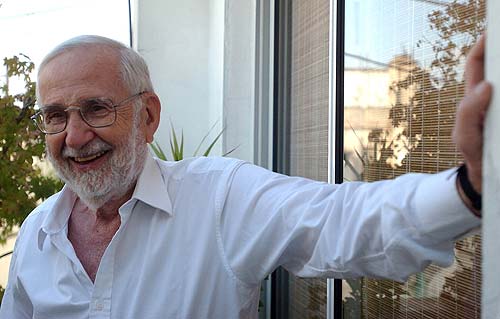Noe Jitrik, noted Argentine writer, historian and literary critic, dies at 94
Argentine writer and academic Noé Jitrik, long known as one of the foremost literary critics in Latin America, has died in Colombia following a stroke. He was 94.
His work was marked by reflections on marginality and dogma, exile and return, lack and excess, autobiography, Argentine nationalism, the state of literary criticism, the avant-garde - as well as his peers in the 'Latin American boom' in literature of the 1960s and '70s.
Born in a small town deep in the Argentine Pampas, in 1928, Jitrik graduated from the University of Buenos Aires but then taught at the more conservative University of Córdoba - where he met his future wife, Tununa Mercado.
Writing for the celebrated Buenos Aires literary journal Contorno through its 1953-59 run, as well as numerous volumes of poetry, he soon became noted among Spanish-language readers not only for his groundbreaking scholarship but also for his wit.
After writing the screenplay for a 1966 thriller Todo sol es amargo (The Sun is Always Bitter), he emigrated to France following a right-wing Argentine coup that year.
He returned to Buenos Aires in 1969, and a series of essays published between then and the late 1990s earned him renown for their scope, his insights into how history and literature interrelate, and his granular knowledge of Latin American literature and its relationship to European writing.
Over the course of his long career, Jitrik's work embraced French structuralist thought, psychoanalysis, semiotics and Marxism.
Jitrik's left-wing sympathies made him a target for the violent Argentine Anti-Communist Alliance however, and in 1974 he emigrated with his family to Mexico.
There, he earned the Xavier Villaurrutia Prize for his 1981 novel Fin de ritual (The End of the Ritual).
He returned to Argentina in 1987, worked as a sociological researcher for the National Sciences Council (CONICET), and from 1991 headed his alma mater's Institute of Hispano-American Literature.
He also wrote a regular literary column for the progressive Buenos Aires daily Página/12 and served as chief editor of Critical History of Argentine Literature, a 12-volume series published between 1999 and 2015.
Jitrik was honored by among others France's Order of Arts and Letters, in 1993, and the Mexican Academy of Language in 2021.
At: https://www-argentina-gob-ar.translate.goog/noticias/adios-al-escritor-y-critico-noe-jitrik?_x_tr_sl=es&_x_tr_tl=en&_x_tr_hl=en&_x_tr_pto=wapp

Argentine writer, critic, and literary historian Noé Jitrik, 1928-2022.
"Literature," Jitrik noted, "becomes social reality as it circulates - and thus has political consequences."
"So much so, that dictatorships seek to control reading - because reading is the point when literature, whether political or not, becomes politics."
